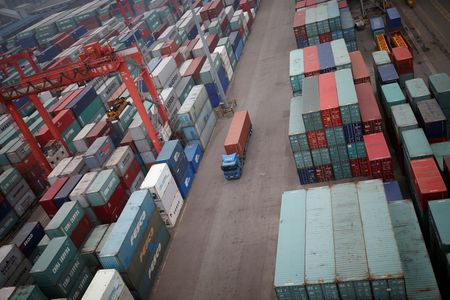By Veronica Dudei Maia Khongwir
BENGALURU (Reuters) – South Korea’s export-dependent economy is forecast to have contracted in the fourth quarter, putting in its worst performance in 2-1/2 years as falling foreign demand and rising interest rates hurt private consumption, a Reuters poll found.
Asia’s fourth-largest economy is expected to have shrunk by a seasonally-adjusted 0.3% in the October-December quarter after growing 0.3% in the preceding period.
All but one of 13 economists in the Jan. 16-19 Reuters poll forecast a contraction, with the other expecting growth to flatline. If realized, it would be the sharpest contraction since mid-2020 when the COVID-19 pandemic was cementing its grip on the world.
On a year-on-year basis, gross domestic product (GDP) likely grew 1.5% in the fourth quarter, the median forecast of 21 economists showed, half the 3.1% growth in the third quarter. Forecasts ranged from 0.7% to 1.9%.
The data will be released on January 26.
“High frequency data showed a broad-based pullback in activity in Q4. The export-oriented manufacturing sector led the weakness, but services activity and retail trade also deteriorated,” wrote Krystal Tan, economist at ANZ.
“The near-term growth outlook remains challenging amid the global tech downcycle and a faltering property market. The weak growth backdrop supports the case for an extended pause by the Bank of Korea.”
Exports fell 9.5% in December from the year before and may weaken further amid growing fears of global recession and an economic slowdown in China, the country’s largest trading partner.
That, along with the Bank of Korea’s (BOK) aggressive interest rate hikes to curb decade-high inflationary pressures will weigh on the economy.
The BOK raised its key policy rate by 25 basis points last week to 3.50%, delivering a total of 300 basis points of hikes since August 2021 to contain inflation.
But as inflation cools and growth declines investors have boosted bets the BOK has reached the end of its rate hike cycle, which would make it the first central bank in the region to do so.
Surging living costs are eroding household income and darkening the outlook for consumption in Korea, where private spending accounts for roughly half of gross domestic product.
House prices fell by nearly 2% last month, the fastest drop since at least 2003.
“We expect a sharp contraction in exports this year. We also expect quarterly contractions in private consumption and fixed investment in H1,” said Sung Eun Jung, senior economist at Oxford Economics.
“As we enter H2, we think both domestic and external forces will turn more favorable as price pressures ease and China’s growth recovers.”
According to a separate Reuters poll, growth was forecast at 2.5% in 2022, slowing to 1.9% this year.
(Reporting by Veronica Dudei Maia Khongwir; Polling by Anant Chandak and Devayani Sathyan; Editing by Jonathan Cable and Elaine Hardcastle)

